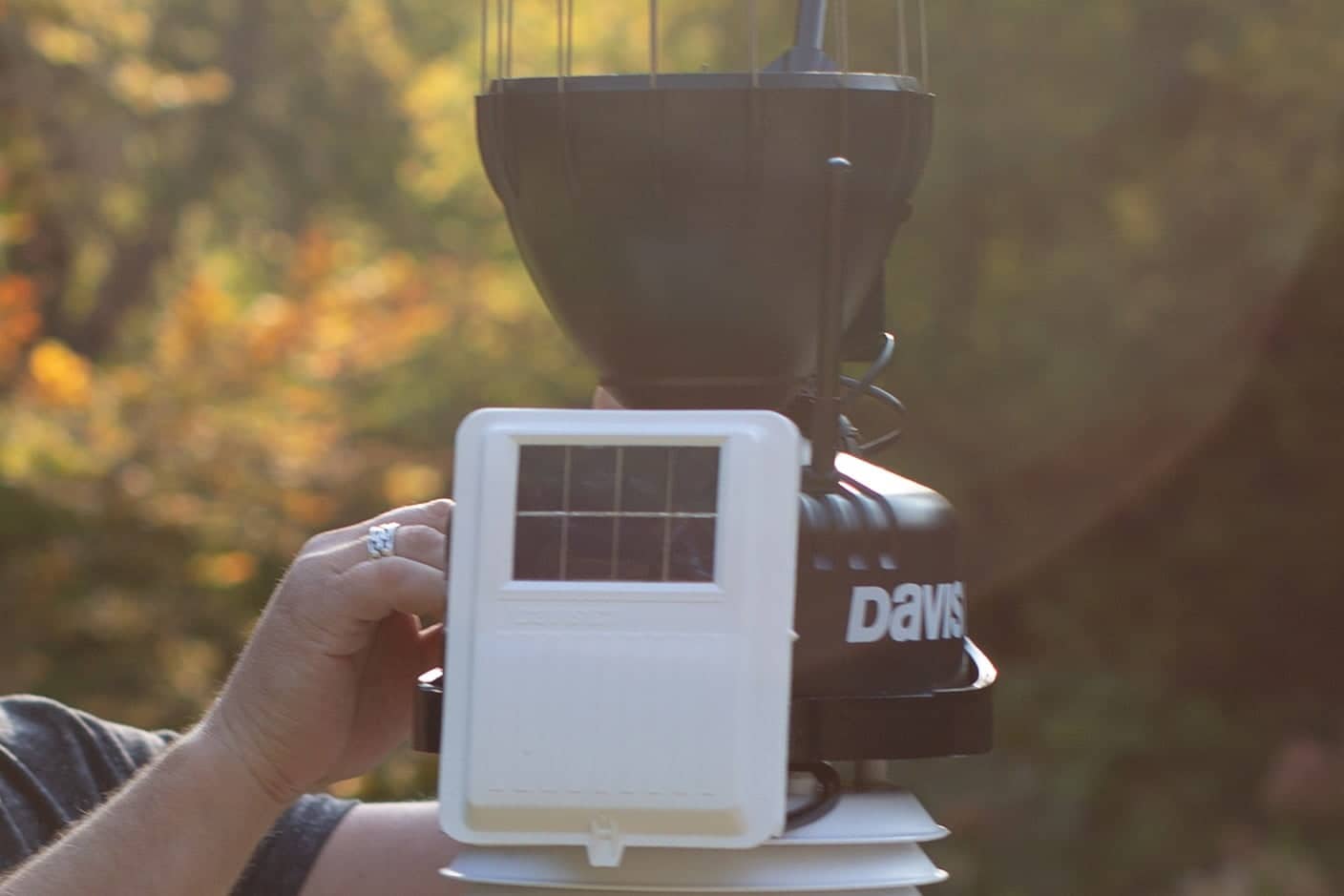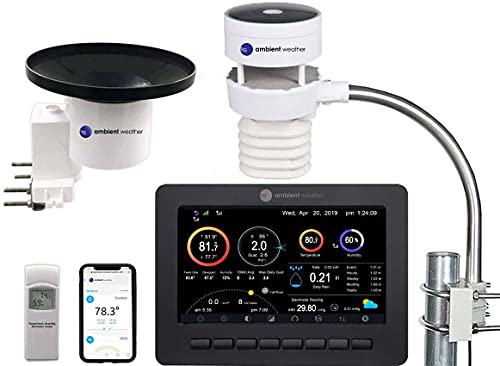The Davis Vantage Pro2 is one of the best high-end home weather stations you can buy and is made even better by WeatherLink Live or the WeatherLink Console. The Vantage Pro2 is a proven workhorse. Several years ago in the Caribbean, a VantagePro 2 recorded a 199mph wind gust in a hurricane before its mast snapped. That’s the highest wind reading ever recorded on a personal weather station!
So why is the Vantage Pro2 more accurate? The sensors in the Vantage Pro2 are of higher quality than in the Vantage Vue. A larger rain gauge collects rain more efficiently, especially in windy situations. The radiation shielding around the temperature and humidity sensor is larger, allowing for better airflow.
Another difference between the VantagePro 2 and the Vantage Vue is the anemometer. Since it’s separate from the rest of the sensor suite, you can place it in a high location to improve your wind readings.
While it takes a bit more time to set up, no other weather station on the market even comes close if you want the most accurate weather data. As a side note, there is also a bundle that includes the console. While the Vantage Pro2’s console is much more helpful than the Vantage Vue’s, it does add to the price. Whether you need it is up to you.
Depending on the model you select, you may also have UV and Light Sensors (standard on the Pro2 Plus), and fan aspiration, which we strongly recommend if you’re very concerned about accuracy. Further optional sensors include soil moisture and leaf wetness sensors, and air quality measurements via AirLink.
You might call the Davis Instruments Vantage Pro2 the “granddaddy” of personal weather stations. This model has been around for the better part of two decades: I owned a first-generation Vantage Pro in the mid-2000s. It was the best weather station I had ever owned and was worth every penny of the $500 I spent on it at the time. Over the past 20 years, inflation has made it more expensive, but it still is an excellent value for the accuracy it provides.
Why has the Vantage Pro2 withstood the test of time? It’s very simple: quality. High-quality sensors provide market-leading accuracy, and corners aren’t cut in construction. This station is one the best you can get in that department. It’s genuinely pro-grade.
But over the past few years, the setup began to feel dated. The Vantage Pro2 has the same connectivity issues as the Vantage Vue. Other weather station manufacturers are adopting new technologies. The Ambient Weather WS-5000 uses a sonic anemometer; the WeatherFlow Tempest features a built-in lightning detector.
Davis is finally starting to address the shortcomings of its lineup. The new WeatherLink Live makes connecting the Vantage Pro2 to the Internet easier. Davis recently made a sonic anemometer an optional upgrade. But is this enough to keep it on top?
Features at a Glance
- Indoor and Outdoor Temperature
- Indoor and Outdoor Humidity
- Barometric Pressure
- Rainfall
- Wind Speed and Wind Direction
- Heat Index and Wind Chill
- Moon Phase and Weather Forecast Icons on Console
Optional
- WeatherLink Live (for internet connectivity)
- AirLink Air Quality Monitor
- Daytime Fan Aspirated Radiation Shield
- 24-hour Fan Aspirated Radiation Shield
- Sonic Anemometer
- Soil Moisture Sensor
- Leaf Wetness Sensor
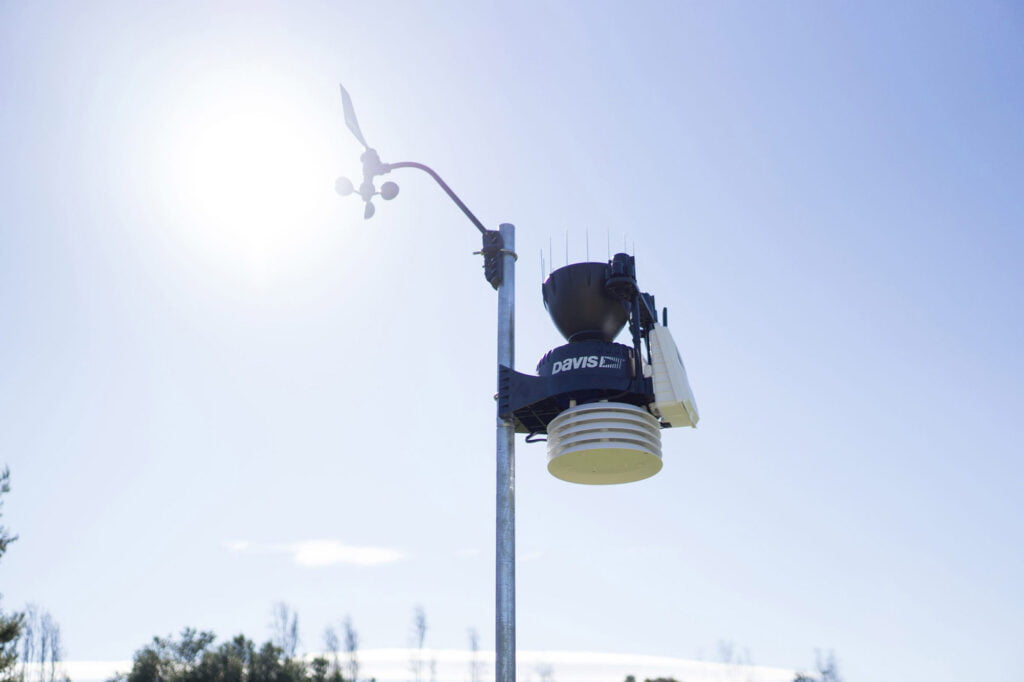
Setting up the Vantage Pro2
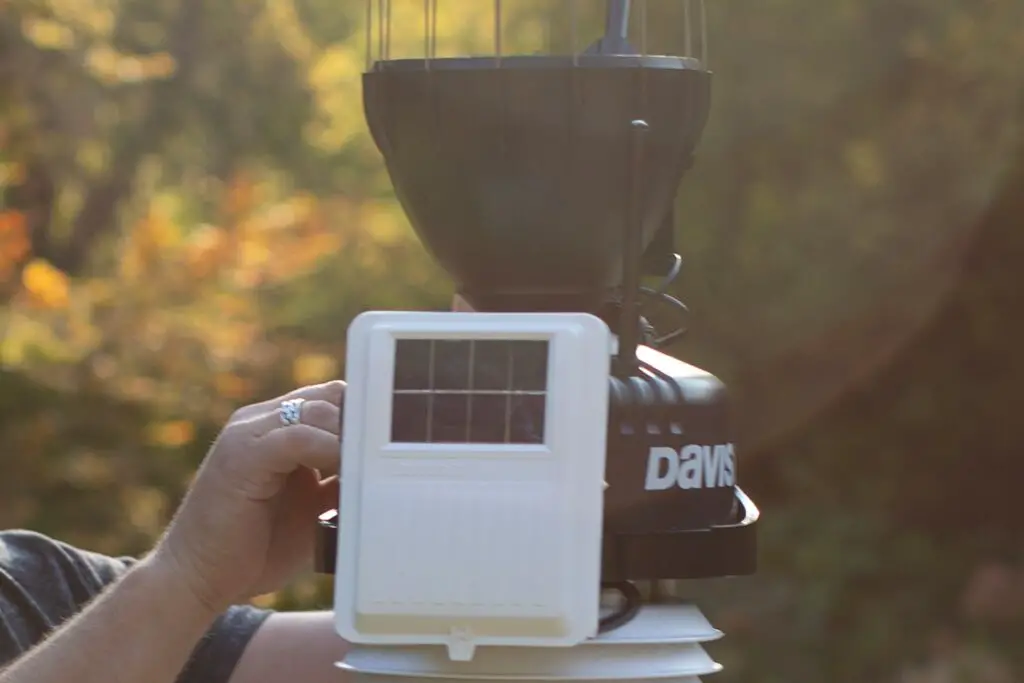
The Vantage Pro2 is a feature-packed station, so there are a lot of parts to put together. And installation time will vary depending on which package you buy: this package should take about 30-45 minutes, although you might need an hour or more.
Install the sensor suite first, as you’ll need it reporting before setting up your WeatherLink Live base unit. Davis’s directions are pretty easy to follow for both, so we doubt you’ll have any issues. See our siting and mounting guide if you need some help placing your weather station.
After both the console and sensor suite are set up, you can set up the rest of your sensors, which are relatively easy to mount and add to the weather station installation.
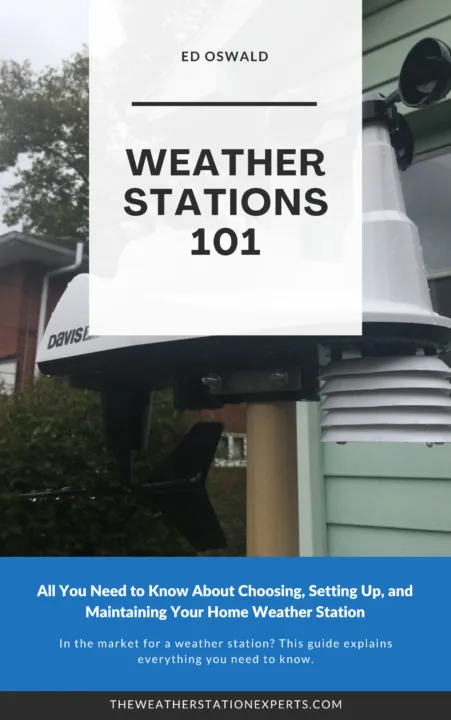
Buying a weather station? No clue where to start?
We can help. Our 40-page book contains tips to help you choose, understand, and maintain your weather station. All proceeds go to help us make more videos!
Buy NowMarket-leading accuracy
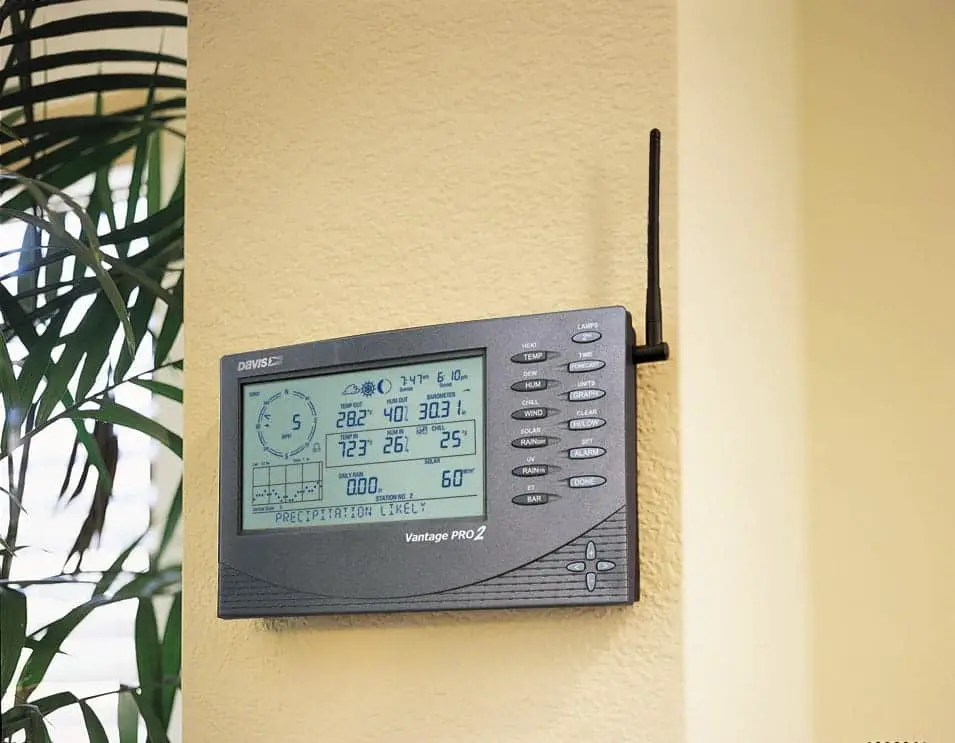
Good luck finding an equal in terms of accuracy — there isn’t one. The Vantage Pro2 is the market leader here. Most of the sensors in the Vantage Pro2 are better versions of what you find in the Vantage Vue — and many are replaceable. An innovative sensor suite is the star of the show here.
There are some differences from model to model in terms of sensor shielding. In higher-end models, the radiation shielding around the temperature and humidity sensor is “fan aspirated.”
Fan aspiration improves the performance of the shielding. While larger space around the temperature/humidity sensor should allow for better airflow than the Vantage Vue’s compact design, some heat buildup still occurs. A fan inside the shielding helps move air around and keeps this from happening.
The Vantage Pro2 also features a large cone called the “Aerocone” to improve the rain gauge’s accuracy. Davis says that the cone’s shape prevents turbulence around the mouth of the gauge, which can prevent rain from making it into the gauge itself.
With the Vantage Pro2, you can choose between the traditional cup and vane anemometer and a new sonic anemometer. While you’ll get better precision wind readings with the sonic anemometer option, you’ll also pay more.
A Dated Display, But
We won’t sugar coat it — the Vantage Pro2 console is pretty dated. But it sure is chock full of information, with indoor and outdoor temperature and humidity, rainfall, wind speed and direction, moon phase, barometric pressure and barometric pressure trend, and a graph to view that and other trends the front screen. A banner across the bottom automatically changes to highlight information, such as a text version of its weather forecast (also displayed!) or important weather measurements.
We hear rumors that the company is working on a new console, but with WeatherLink Live out. We believe Davis is moving towards console-less stations, much like the WeatherFlow Tempest. But for now, you’ll have to deal with your real-time data on a console that looks out of the 1990s.
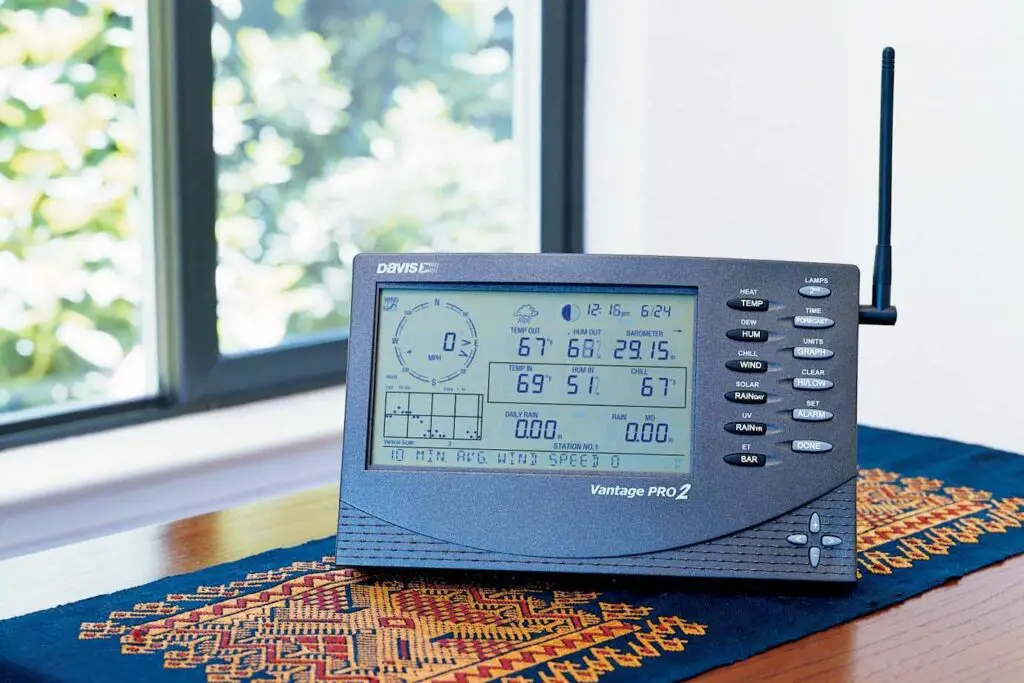
Comparisons
We increasingly see comparisons between the WS-5000 and the Vantage Pro2. We think this is a fair comparison, as the WS-5000 is Ambient Weather’s top-of-the-line model. However, we still feel the Vantage Pro2 has more accurate instrumentation overall. If you have a smart home, you’ll need the WS-5000. Davis weather stations just don’t cut it for smart homes.
We sincerely hope that Davis Instruments is working on a solution to this. While their new WeatherLink Live base unit provides more connectivity, it is still insufficient.
Upgradability and expandability
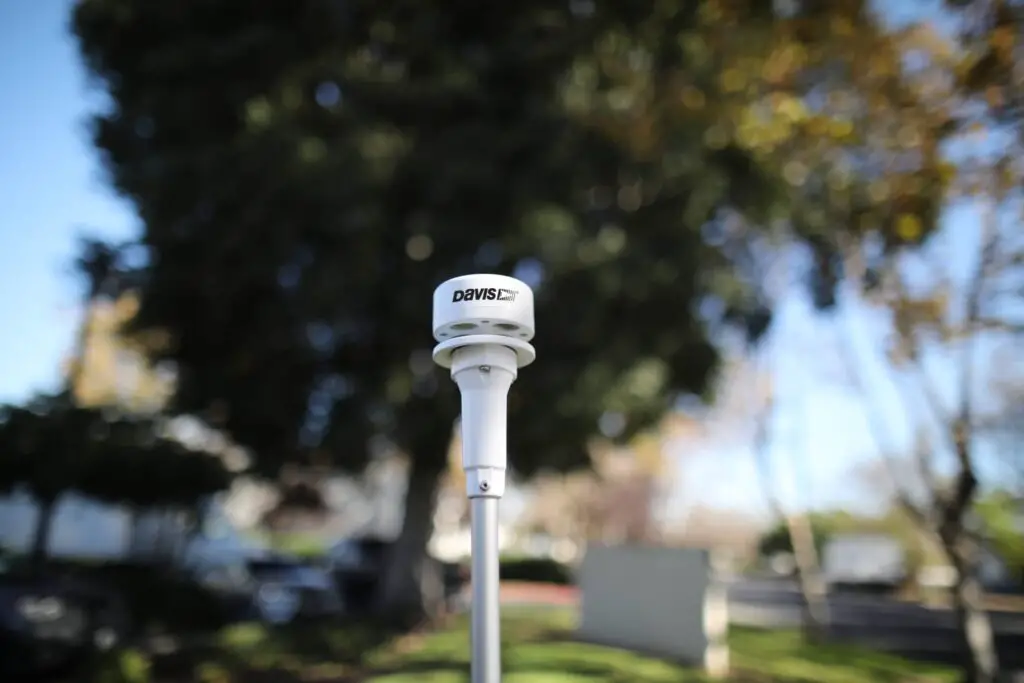
While the WeatherLink Live does at least make the Vantage Vue slightly more expandable than it was before, you’ll still need to buy a Vantage Pro2 for most of Davis’ optional sensors.
Davis’ new AirLink air quality monitor is a solid addition and is one of the few on the market to measure PM1 and the standard PM2.5 and PM10 pollutants. The UV and solar radiation sensors are helpful if you’re frequently outdoors. There are also leaf and wetness sensors, which are great for gardeners.
The only negative is that these sensors can add up: they’re not cheap. But the same Davis quality is there, too — these have excellent track records in long-term reliability.
Which Vantage Pro2 do I need?
Davis now has quite a few different package options available. To make it easier to choose, we’ve narrowed the list to the best options we recommend.
| Package | Highlights |
|---|---|
| Davis Instruments 6153 Vantage Pro2 Wireless Weather Station with 24-Hour Fan Aspirated Radiation Shield and LCD Display Console | The 24-hour fan-aspirated radiation shield provides the most accurate temperature and humidity readings. |
| Davis Instruments 6163 Vantage Pro2 Plus Wireless Weather Station with UV Sensor, Solar Radiation Sensor and 24-hr Fan-Aspirated Radiation Shield | Davis’s top-end model includes the optional UV and solar sensors. If you want all the bells and whistles, this is it. |
| WeatherLink Live Base Unit | Neither of the two models above includes WeatherLink Live, so you’ll need to purchase this separately. |
WeatherLink Live
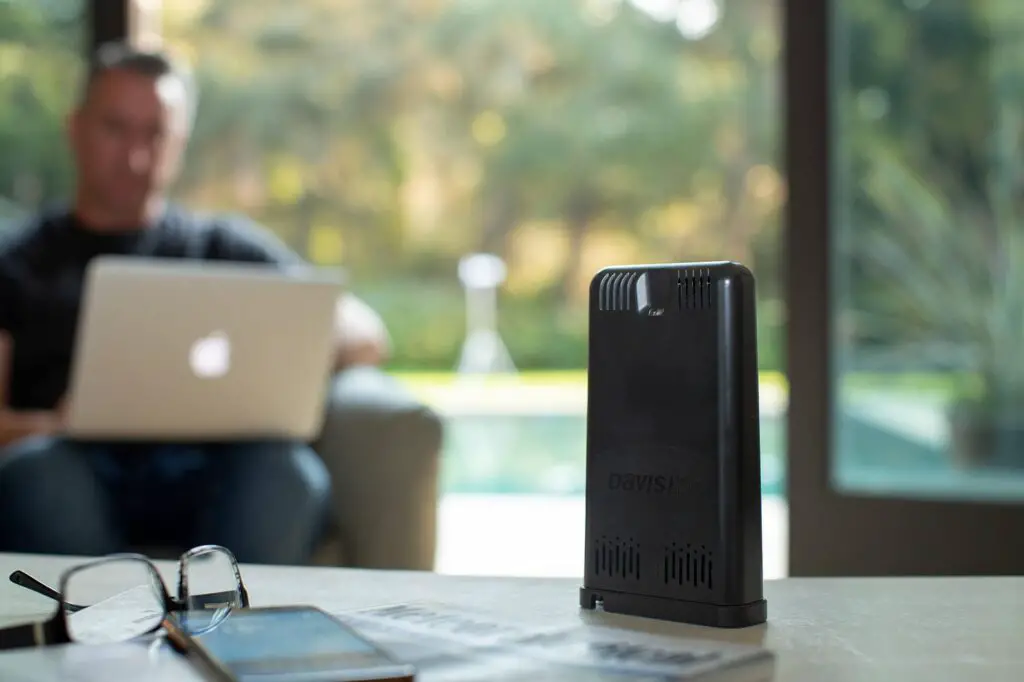
The addition of WeatherLink Live seriously upgrades the communication capabilities of the Vantage Pro2. Previously, you had to purchase an expensive (and outdated) ethernet dongle to connect your station to the Internet.
While real smart home connectivity other than an Alexa app is still missing, WeatherLink Live makes more sense. The newer sensors that Davis is releasing are built to be compatible with the WeatherLink Live directly, so options may grow with time on what you can do.
What we like about the connectivity is the live updating within the app. It’s a nifty feature, and I’ll admit to watching it intently during some of our stormiest weather.
What’s nice is, from what we’ve seen, it isn’t any more expensive than the old dongle, which didn’t have the functionality the WeatherLink Live has. Unfortunately, it’s also not any cheaper.
The Vantage Pro2 can’t be beat
The only thing that holds us back from giving the Vantage Pro2 five stars is its connectivity options. While it’s improved, it’s still behind everyone else. Otherwise, the Vantage Pro2 is in a class of its own.
Of course, the price of this weather station is a big deterrent. It doesn’t make much sense for a casual weather observer to buy the Vantage Pro2 — a station like the Ambient Weather WS-2902 would better serve these users. But for serious weather enthusiasts looking for a solution with proven long-term reliability and accuracy that none can match, the Vantage Pro2 should be at the top of your list.
For those looking for a more budget-friendly high-end station, we’d recommend considering the Ambient Weather WS-5000. But remember that while very good, the accuracy still doesn’t match what we see out of the Vantage Pro2 line.
Davis Instruments Vantage Pro2
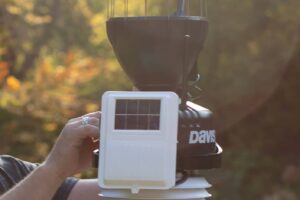
Davis' Vantage Pro2 has been around forever. Can the "granddaddy" of personal weather stations keep up with its competitors? We think it can, for now.
Product SKU: 6112
Product Brand: Davis Instruments
Product In-Stock: InStock
4.5


